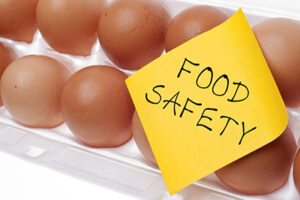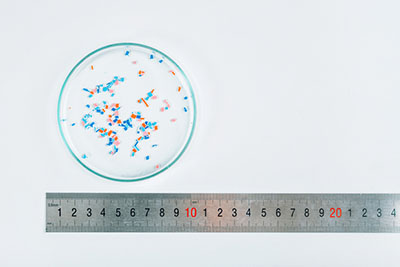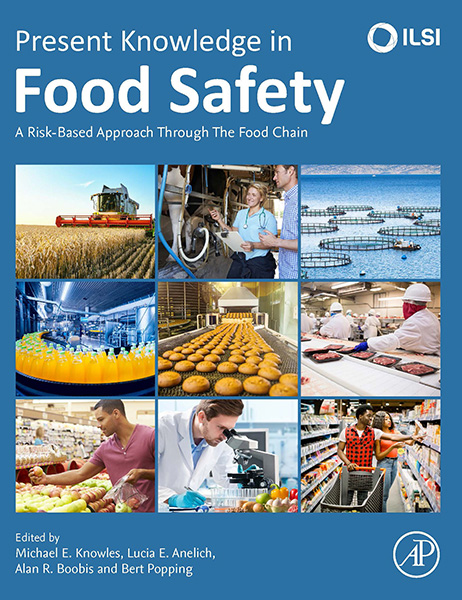ILSI Federation Newsletter: Food Contaminants
June 2023
Our newsletter intends to provide an overview of upcoming, current and recent ILSI Federation activities in the field of food contaminants. With this edition, we place food safety at the heart of the discussion on healthy food for all. As per Codex Alimentarius, contaminants are substances that are not intentionally added to food products at any moment across the food system, including manufacturing, handling, storage, processing and distribution.

ILSI Federation Activities
ILSI works with researchers from the public and private sectors, as well as academia, on translational and pre-competitive science and health issues to address common interests or concerns. Public-private collaboration – where all interests, conflicts and biases are declared and all funding is acknowledged – can improve the science used to promote the health and safety of the public and the environment. Together with its hundreds academic institutions from around the world, public sector agencies, more than 170 member companies and civil society organizations, the ILSI Federation develops project proposals that address important public health issues with the highest standards of Scientific Integrity.
Upcoming and Ongoing ILSI Activities
Integrated Food Chain Surveillance for Enhancing Food Safety: A Model Approach
This white paper was commissioned by ILSI India's Scientific Advisory Committee, and prepared by Dr. Vasanthi Siruguri (Former Scientist, Senior Deputy Director, Food Safety Division, ICMR – National Institute of Nutrition, Hyderabad, India). The review highlights the problem of contamination with microbial pathogens at various points in the food chain during their production, harvest, processing, transport or during preparation at the home level. The paper points out that integrated food chain surveillance relies on diverse information sources from multiple sectors for integrating surveillance data. In view of limited resources, it is imperative that the collaboration and partnerships between food, animal and human health sectors is initially strengthened or enhanced. The creation of a national integrated food safety and food borne disease surveillance program for the whole food chain that is based on the model of an integrated food chain approach is, perhaps, a reasonable approach so that a full-fledged surveillance system devoted to food safety and food borne events can emerge in India. Reach out to Rekha (rsinha@ilsi-india.org) for more information regarding this review, which is expected to be released publicly in the summer of 2023.
Capacity Building Program for Microbiological Risk Assessment (MRA)
This program, co-organized by ILSI Southeast Asia Region and the ASEAN Risk Assessment Center for Food Safety, was initiated in 2022 by a webinar series, which focused on enhancing the general knowledge about MRA and the development of an MRA request. Also, the series focused on strengthening the communication between risk assessors and risk managers. A follow-up half-day seminar and a two-day in-person workshop are scheduled for September 2023 to provide hands-on training on MRA and data requirements, as well as to establish a supporting network for MRA in the ASEAN region. The workshop is set to be held at the Food Safety and Quality Division of the Malaysian Ministry of Health (Putrajaya, Malaysia). Contact Boon Yee Yeong for more information (boonyee@ilsisea.org.sg).
ILSI Mesoamerica Food Safety Committee
 This Committee, chaired by Dr. Jessie Usaga Barrientos (Professor, School of Food Technology, University of Costa Rica; Researcher, National Center for Food Science and Technology) and Dr. Juan Manuel de la Fuente Martinez (Scientific Regulatory Affairs Manager, Bayer), works to identify food safety issues that impact food systems. It is launching its 2023-2024 annual training program aimed at promoting a positive food safety culture in Mesoamerica. Please reach out to Hannia (executivedirector@ilsimesoamerica.org) for more information about this training series.
This Committee, chaired by Dr. Jessie Usaga Barrientos (Professor, School of Food Technology, University of Costa Rica; Researcher, National Center for Food Science and Technology) and Dr. Juan Manuel de la Fuente Martinez (Scientific Regulatory Affairs Manager, Bayer), works to identify food safety issues that impact food systems. It is launching its 2023-2024 annual training program aimed at promoting a positive food safety culture in Mesoamerica. Please reach out to Hannia (executivedirector@ilsimesoamerica.org) for more information about this training series.
- Strategies for the Control of Listeria monocytogenes in ready-to-eat Foods - This webinar will relate to the available strategies for the control of Listeria monocytogenes in ready-to-eat foods and is addressed to professionals in the food industry. The webinar will be held on June 29th, 2023 and the registration link can be found here.
- Biologic hazards, Transmission and Control of Viruses in Food - This webinar will be hosted on September 28th, 2023. Register here.
- Parasite Control in Food - This webinar will focus on strategies available to control parasites in food and is scheduled for February 24th, 2024. Register here.
- Allergens Control - Lessons learned from successful cases of allergen control in food processing plants will be presented during this webinar set for April 25th, 2024. For more information, please visit ILSI Mesoamerica's website and social media: @ilsimesoamerica.
ILSI Europe Task Forces and Scientific Activities on Food Safety
 ILSI Europe has several active task forces (TFs) composed of scientists from the public and private sectors who volunteer to address non-competitive research gaps in the field of food safety and contaminants, in particular. A brief list of their current activities is provided below. Contact Isabelle for more information (iguelinckx@ilsieurope.be).
ILSI Europe has several active task forces (TFs) composed of scientists from the public and private sectors who volunteer to address non-competitive research gaps in the field of food safety and contaminants, in particular. A brief list of their current activities is provided below. Contact Isabelle for more information (iguelinckx@ilsieurope.be).
- Food Contaminants TF – This group collaborates to address research gaps in toxicity, exposure and analytical aspects of food contaminants, and to advance the scientific knowledge on food contaminants (process-related contaminants, natural toxins and other environmental contaminants) focusing on assessing their impact on human health. A current activity pertains to food contaminants definitions.
- Food Allergy TF – An ongoing project aims to facilitate the introduction of novel protein sources by means of an allergenicity assessment tool with a better alignment of scientific test methodologies and risk management objectives. An upcoming project aims to establish criteria for best practices in risk management and risk communication pertaining to unintended allergen presences that are compatible with "Precautionary Allergen Labelling" to ensure that consumers with food allergies are further protected.
- Microbiological Food Safety TF - Aims to facilitate the development of harmonized, science-based approaches to predict and prevent risks associated with foodborne pathogens. Its current focus is to identify the microbiological hazards associated with dried spices, herbs, vegetables and fruits.
- Packaging Materials TF – This task force strives to understand the challenges to ensure safe food contact materials for food consumption by evaluating the safety of food contact materials and their interaction with food to ensure consumer safety and minimal environmental impact. An ongoing project aims to provide recommendations on the most appropriate risk assessment approaches to use, particularly for non-harmonized food contact materials.
- Microplastic Initiative TF – This expert panel aims to consolidate the current scientific, state of the art in dietary microplastics analysis, and to address relevant concerns associated with their impact on consumer health.
Microplastics in Foods and the Environment
ILSI Taiwan will host a seminar to present the current status of detection and distribution of microplastics in food and in the environment. Stay tuned! Contact Bonnie (bonnie@ilsitaiwan.org) for more information.
Novel Technologies in Food Safety Risk Assessment
The rapid development of new technologies for the detection of food safety hazards and their control, together with the introduction of artificial intelligence in food production and safety assessment, marks the fourth industrial revolution. In conjunction with ILSI Taiwan's 10th anniversary and annual meeting, ILSI Taiwan will host a symposium on "Novel Technologies in Food Safety Risk Assessment" on July 28th, 2023, in Taipei. This symposium will provide updates on alternatives to animal testing approaches used in safety assessments of foods and food ingredients, share recent applications of AI in food safety assessments, and discuss the new methodologies employed in safety control of food contaminants. Contact Bonnie (bonnie@ilsitaiwan.org) for more information.
New Advancement in Food Toxicology Techniques
ILSI India will organize a workshop to discuss the latest technologies related to food toxicology and their relevance for application in India. Please contact Rekha (rsinha@ilsi-india.org) for more information about this upcoming workshop.
Best Practices for Use and Disposal of Plant Protection Chemicals: Science and Future Approaches
While weeds and pests continue to pose a serious threat to achieving sustainable and profitable crop production globally, increasing populations and pressures on the availability of arable land and water are major factors hampering increased plant productivity in food-producing and exporting countries, such as Vietnam. ILSI Southeast Asia Region will host a workshop to review the best practices of plant protection chemicals' applications currently in use in Vietnam. It will address human and environmental exposures, data gaps and the potential improved approaches available. This workshop is tentatively scheduled for early fall 2023. Contact Boon Yee Yeong for more information (boonyee@ilsisea.org.sg).
Recent ILSI Events and Publications
Food Contaminants: Emerging Challenges between Safety and Sustainability

ILSI Europe, in collaboration with the Wageningen University and under the patronage of the European Parliament, held a day-long seminar that presented the relationship between changing food chains and emerging risks associated with food contaminants. The program of the event can be found here. Please reach out to Konrad for access to the seminar's slides (kkorzeniowski@ilsieurope.be).
CODEX Committee on Contaminants in Foods (CCCF)
ILSI Europe participated in the CODEX Alimentarius CCCF meeting as an observer (Utrecht (NL), April 18, 2023).
The Codex Alimentarius, also called the "Food Code," consists of standards, guidelines and codes of practice established by the Codex Alimentarius Commission. The Commission, known as CAC, was created by FAO and WHO in 1963 to safeguard consumer health and ensure fairness in food trade. Matters discussed during the day:
- Sampling plans for total aflatoxins in certain cereals.
- Review of staple food contaminant combinations for future work of CCCF.
- Foresight: looking into emerging issues in Food and Feed Safety.
- Matters referred to the Committee by the Codex Alimentarius Commission and/or its subsidiary bodies.
- Matters of interest arising from FAO and WHO, including the Joint FAO/WHO Expert Committee on Food Additives.
Contact Konrad for more information (kkorzeniowski@ilsieurope.be).
An Overview of Approaches for Analyzing Non-Intentionally Added Substances (NIAS) from Different Food Contact Materials (FCMs)
This report commissioned by the Packaging Materials Task Force of ILSI Europe describes the different tests available for FCMs, and their weaknesses for non-harmonized FCMs. It also provides an ideal introduction for non-dedicated analysts willing to learn more about analytical techniques and interpretation of their results in this field. Find the report here. A previous peer-reviewed publication can be found here, providing guidance in selecting analytical methods for identification and quantification of NIAS in FCMS.
Cronobacter in the Spotlight: New Insights into a Known Organism
Processing Environment Monitoring in Low Moisture Food Production Facilities: Are We Looking for the Right Microorganisms?
The Microbiological Food Safety task force at ILSI Europe presents a peer-reviewed study on the prevalence of pathogens of concerns for low moisture foods (LMF) through the investigation of the reported foodborne outbreaks. The published study is available here.
Guidance on Validation of Lethal Control Measures for Foodborne Pathogens in Foods
This review, commissioned by the ILSI Europe Microbiological Food Safety task force, is a guide for the food industry to support appropriate validation studies and to limit methodological discrepancies in validation studies currently occurring among food safety professionals, consultants and third-party laboratories. The peer-reviewed publication is accessible here.
Scientific Management of Hazardous Substances in Foods: Focusing on Pesticide Residues
ILSI Korea presents a report here (in Korean; Summary in English) emphasizing the need for scientific data concerning pesticide management and assessment, reflecting the recent increase in food import, the change in dietary habits and climate change.
Contaminants in Water
 ILSI Brazil's Agrochemicals and Food Safety task forces commissioned a full-day event presenting an overview of water contaminants, from heavy metals to pesticides, drugs and cosmetics. Watch the event here (in Portuguese).
ILSI Brazil's Agrochemicals and Food Safety task forces commissioned a full-day event presenting an overview of water contaminants, from heavy metals to pesticides, drugs and cosmetics. Watch the event here (in Portuguese).
Present Knowledge in Food Safety: A Risk-Based Approach Through the Food Chain
This ILSI book presents approaches for exposure-led risk assessment wherever possible and the management of changes in the chemical, pathogenic, microbiological and physical (radioactivity) contamination of food at all key stages of production, from farm to consumption, which may adversely impact safety. This comprehensive resource introduces scientific advances at all stages of production to improve the reliability, predictability and relevance of food safety assessments, and the communication challenges thereof, for the protection of public health. The book can benefit a wide range of professionals in the fields of public health, government regulation and policy, as well as food and agriculture production, scholars and educators, and research scientists in the fields of food safety, food science, chemistry, microbiology, toxicology, agriculture, aquaculture, pharmacy, nutrition and more. Contact James (jcameron@ilsi.org) for more information.
From Around the World
International Organizations
54th Session of the Codex Committee on Pesticide Residues
CCPR54 (June 26-July 1, 2023, Beijing, China) will include matters arising from FAO and WHO – such as One Health and Pesticide Risk Reduction – and matters arising from other international organizations, such as FAO/IAEA (International Atomic Energy Agency) activities.
International Society for Environmental Epidemiology
The International Society for Environmental Epidemiology's 35th Annual Conference, "Connecting the East and the West, One Health in One Planet" (September 17-21, 2023, Kaohsiung, Taiwan), will focus on the relationships between environmental exposures (including food and water contaminants, metals, etc.) and human health.
Regional Organizations
China
Sustainable China International Food Safety & Quality Conference (November 2-3, 2023, Beijing Central, China), where up to 1,000 regulators, scientists, industry executives, technologists and academics will discuss food allergen control, special purpose foods, chemical contaminant analysis, alternative protein, food borne diseases, mycotoxin, medicine food homology, food integrity and authenticity, and rapid microbial detection and sample preparation.
Europe
Food Allergy Forum, 3rd International Conference (September 27-29, 2023, Amsterdam, The Netherlands), during which ILSI Europe will host a training program on "Demystifying the Risks of Allergy Risk assessment," as well as a session to present its Food Allergy Task Force's work to develop allergen risk assessment and management in Europe.
EUROTOX. The 57th Congress of the European Toxicologists and European Societies of Toxicology, will meet in Ljubljana, Slovenia (September 10-13, 2023), under the theme "Toxicology – multidisciplinary science leading safer and sustainable life," will emphasize the breadth of toxicology and the importance of interdisciplinary collaboration.
Latin and South America
Congreso Latinoamericano de Inocuidad Alimentaria (2024, Cancun, Mexico).
Latin American Pesticide Residues Workshop. The 9th LAPRW Conference (May 21-24, 2023, Panama City, Panama) focused on growing the knowledge of pesticide chemistry in Latin America.
U.S. and Canada
The International Association for Food Protection Annual Meeting (July 16-19, 2023 Toronto, Ontario, Canada) will bring thousands of top industry, academics and governmental food safety professionals from six continents to discuss the latest developments in food safety.
FDA. Public Health Advisories from Investigations of Foodborne Illness Outbreaks (which result from an outbreak investigation) and Coordinated Outbreak Response and Evaluation (CORE) Network to manage outbreak response, as well as surveillance and post-response activities related to illnesses linked to FDA-regulated human food, dietary supplements and cosmetic products.

